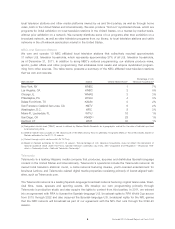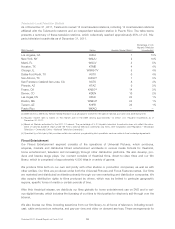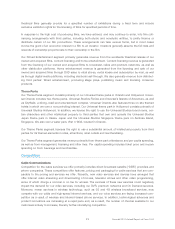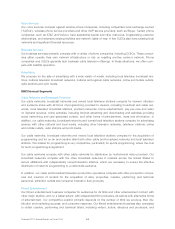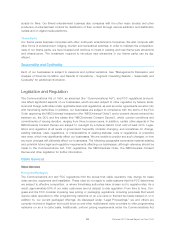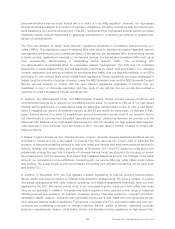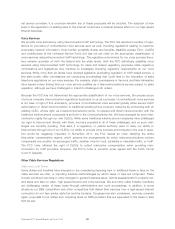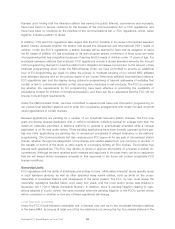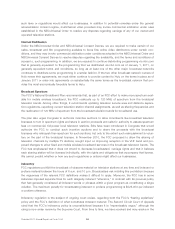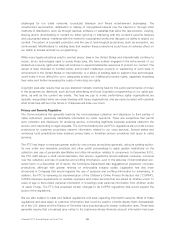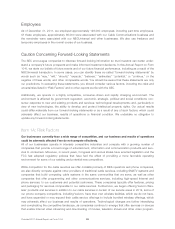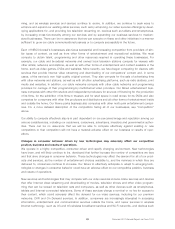Comcast 2011 Annual Report Download - page 21
Download and view the complete annual report
Please find page 21 of the 2011 Comcast annual report below. You can navigate through the pages in the report by either clicking on the pages listed below, or by using the keyword search tool below to find specific information within the annual report.telecommunications service under federal law or to state or local utility regulation. However, our high-speed
Internet services are subject to a number of regulatory obligations, including compliance with the Communica-
tions Assistance for Law Enforcement Act (“CALEA”) requirement that high-speed Internet service providers
implement certain network capabilities to assist law enforcement in conducting surveillance of persons sus-
pected of criminal activity.
The FCC has adopted so-called “open Internet” regulations applicable to broadband Internet service pro-
viders (“ISPs”). The regulations require broadband ISPs such as us to disclose information regarding network
management, performance and commercial terms of the service; bar broadband ISPs from blocking access
to lawful content, applications, services or non-harmful devices; and bar wireline broadband ISPs such as us
from unreasonably discriminating in transmitting lawful network traffic. The no-blocking and
non-discrimination requirements allow for reasonable network management. The FCC has not prohibited
speed tiers or usage-based pricing, but has specifically noted that so-called “paid prioritization” (i.e., charging
content, application and service providers for prioritizing their traffic over our last-mile facilities) or an ISP’s
prioritizing its own content likely would violate these regulations. These regulations are being challenged in
federal court by a number of parties. However, under the NBCUniversal Order and the NBCUniversal Consent
Decree, we are required to comply with the open Internet regulations regardless of whether they are
invalidated in court or otherwise rescinded, and they apply to any set-top box we provide that enables a
customer to receive broadband Internet access service.
In addition, the NBCUniversal Order and NBCUniversal Consent Decree include various conditions and
commitments requiring us to expand our broadband service areas, to continue to offer all of our high-speed
Internet service speed tiers on a standalone basis at reasonable market-based prices, to offer a new stand-
alone 6 megabits per second downstream service at $49.95 per month for three years, to maintain a high-
speed Internet service of at least 12 megabits per second downstream across most of our footprint, and to
not discriminate in how we treat so-called “specialized services” (defined as services we provide over the
same last-mile facilities as our high-speed Internet service, but not including our high-speed Internet service,
video services or voice services). Over the course of 2011, we have taken a number of steps to comply with
these conditions.
A federal program known as the Universal Service program generally requires telecommunications service
providers to collect and pay a fee based on revenue from their services into a fund used to subsidize the
provision of telecommunications services in high-cost areas and Internet and telecommunications services to
schools, libraries and certain health care providers. In November 2011, the FCC issued an order that would
substantially change the way that a majority of Universal Service funds are allocated. By focusing on broad-
band deployment, and moving away from supporting traditional telephone service, the changes could assist
some of our competitors in more effectively competing with our service offerings, while others could receive
less funding. The actual impact is unknown because the funding cost allocation model has not yet been final-
ized by the FCC.
In addition, in November 2011 the FCC initiated a further rulemaking on Internet protocol interconnection
issues, which may have an impact on Internet interconnection arrangements. We have a number of peering
and transit arrangements with other network operators, and these arrangements historically have not been
regulated by the FCC. We cannot predict what, if any, proposals might be adopted or what effect they might
have on our business. In addition, Congress and federal regulators have adopted a wide range of measures
affecting Internet use, including, for example, consumer privacy, consumer protection, copyright protection,
defamation liability, taxation, obscenity and unsolicited commercial e-mail. State and local governments also
have adopted Internet-related regulations. Furthermore, Congress, the FCC and certain state and local gov-
ernments are considering proposals to impose customer service, quality of service, expanded copyright
protection requirements, taxation, child safety, privacy and standard pricing regulations on high-speed Inter-
19 Comcast 2011 Annual Report on Form 10-K


